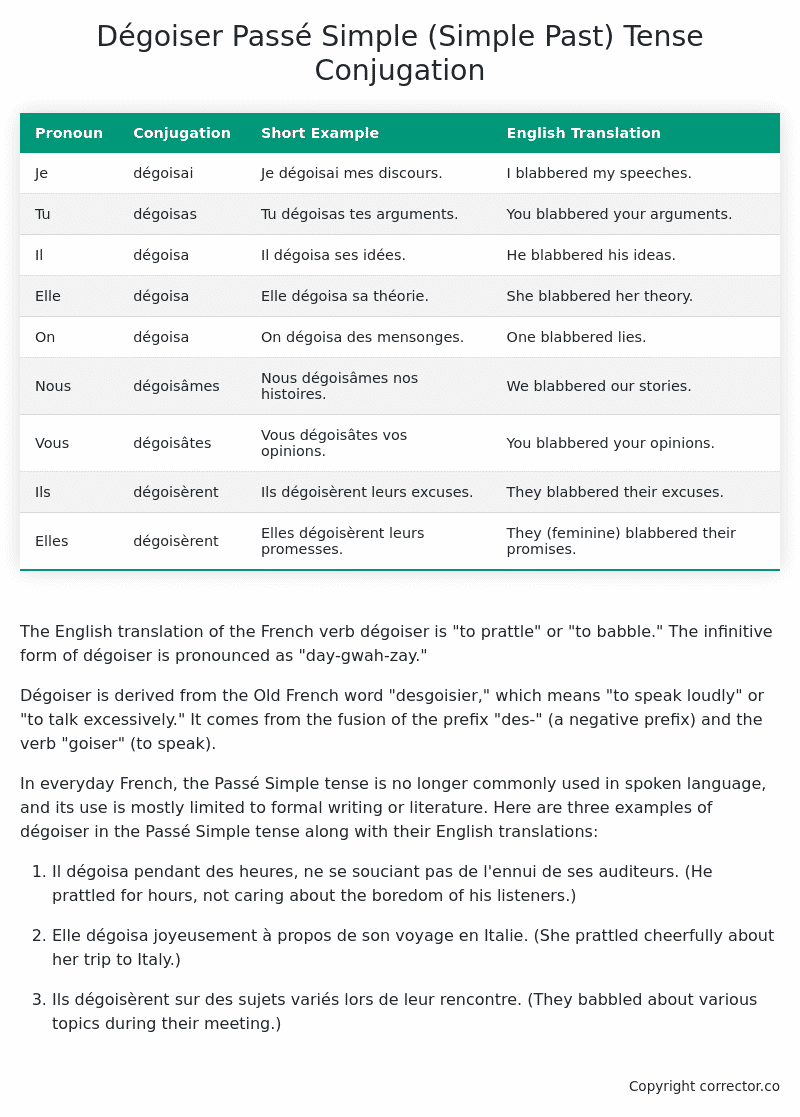Passé Simple (Simple Past) Tense Conjugation of the French Verb dégoiser
Introduction to the verb dégoiser
The English translation of the French verb dégoiser is “to prattle” or “to babble.” The infinitive form of dégoiser is pronounced as “day-gwah-zay.”
Dégoiser is derived from the Old French word “desgoisier,” which means “to speak loudly” or “to talk excessively.” It comes from the fusion of the prefix “des-” (a negative prefix) and the verb “goiser” (to speak).
In everyday French, the Passé Simple tense is no longer commonly used in spoken language, and its use is mostly limited to formal writing or literature. Here are three examples of dégoiser in the Passé Simple tense along with their English translations:
-
Il dégoisa pendant des heures, ne se souciant pas de l’ennui de ses auditeurs.
(He prattled for hours, not caring about the boredom of his listeners.) -
Elle dégoisa joyeusement à propos de son voyage en Italie.
(She prattled cheerfully about her trip to Italy.) -
Ils dégoisèrent sur des sujets variés lors de leur rencontre.
(They babbled about various topics during their meeting.)
Table of the Passé Simple (Simple Past) Tense Conjugation of dégoiser
| Pronoun | Conjugation | Short Example | English Translation |
|---|---|---|---|
| Je | dégoisai | Je dégoisai mes discours. | I blabbered my speeches. |
| Tu | dégoisas | Tu dégoisas tes arguments. | You blabbered your arguments. |
| Il | dégoisa | Il dégoisa ses idées. | He blabbered his ideas. |
| Elle | dégoisa | Elle dégoisa sa théorie. | She blabbered her theory. |
| On | dégoisa | On dégoisa des mensonges. | One blabbered lies. |
| Nous | dégoisâmes | Nous dégoisâmes nos histoires. | We blabbered our stories. |
| Vous | dégoisâtes | Vous dégoisâtes vos opinions. | You blabbered your opinions. |
| Ils | dégoisèrent | Ils dégoisèrent leurs excuses. | They blabbered their excuses. |
| Elles | dégoisèrent | Elles dégoisèrent leurs promesses. | They (feminine) blabbered their promises. |
Other Conjugations for Dégoiser.
Le Present (Present Tense) Conjugation of the French Verb dégoiser
Imparfait (Imperfect) Tense Conjugation of the French Verb dégoiser
Passé Simple (Simple Past) Tense Conjugation of the French Verb dégoiser (You’re reading it right now!)
Passé Composé (Present Perfect) Tense Conjugation of the French Verb dégoiser
Futur Simple (Simple Future) Tense Conjugation of the French Verb dégoiser
Futur Proche (Near Future) Tense Conjugation of the French Verb dégoiser
Plus-que-parfait (Pluperfect) Tense Conjugation of the French Verb dégoiser
Passé Antérieur (Past Anterior) Tense Conjugation of the French Verb dégoiser
Futur Antérieur (Future Anterior) Tense Conjugation of the French Verb dégoiser
Subjonctif Présent (Subjunctive Present) Tense Conjugation of the French Verb dégoiser
Subjonctif Passé (Subjunctive Past) Tense Conjugation of the French Verb dégoiser
Subjonctif Imparfait (Subjunctive Imperfect) Tense Conjugation of the French Verb dégoiser
Subjonctif Plus-que-parfait (Subjunctive Pluperfect) Tense Conjugation of the French Verb dégoiser
Conditionnel Présent (Conditional Present) Tense Conjugation of the French Verb dégoiser
Conditionnel Passé (Conditional Past) Tense Conjugation of the French Verb dégoiser
Conditionnel Passé II (Conditional Past II) Tense Conjugation of the French Verb dégoiser
L’impératif Présent (Imperative Present) Tense Conjugation of the French Verb dégoiser
L’impératif Passé (Imperative Past) Tense Conjugation of the French Verb dégoiser
L’infinitif Présent (Infinitive Present) Tense Conjugation of the French Verb dégoiser
L’infinitif Passé (Infinitive Past) Tense Conjugation of the French Verb dégoiser
Le Participe Présent (Present Participle) Tense Conjugation of the French Verb dégoiser
Le Participe Passé (Past Participle) Tense Conjugation of the French Verb dégoiser
Struggling with French verbs or the language in general? Why not use our free French Grammar Checker – no registration required!
Get a FREE Download Study Sheet of this Conjugation 🔥
Simply right click the image below, click “save image” and get your free reference for the dégoiser Passé Simple tense conjugation!

Dégoiser – About the French Passé Simple (Simple Past) Tense
Formation
Usage
Narration
Historical Context
Interactions with other tenses
Passé Composé
Imparfait
Conditional and Subjunctive
Summary
I hope you enjoyed this article on the verb dégoiser. Still in a learning mood? Check out another TOTALLY random French verb conjugation!


